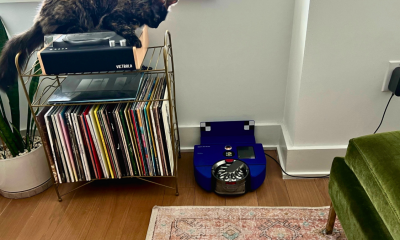Technology
iPhone game helps heart surgeons save lives

Sam Glassenberg is no doctor, but he was happy to perform a colonoscopy before a crowd of hundreds in Los Angeles this June.
“This polyp is attached to a blood vessel, so if you try to remove it, it bleeds,” he explained. Blood gushed while the crowd winced and moaned.
No, Glassenberg was not operating on a real patient. He was at the Social Innovation Summit in Los Angeles, showcasing a colonoscopy “game” that his company, Level Ex, has developed to help train doctors.
“We capture the challenges of the practice of medicine — diagnosis, clinical challenges, procedural challenges — and we capture them as video game mechanics,” Glassenberg told Mashable.
The colonoscopy is just one of dozens of procedural options within Level Ex’s four distinct game apps — Airway Ex, Gastro Ex, Pulm Ex, and Cardio Ex — which each contain simulations of real-life operations. Simply by downloading an app onto a smartphone or tablet, doctors and students can practice their craft, playing hyper-realistic surgical video games that simulate procedures like intubation, endoscopies, and, most recently, heart surgery, says Glassenberg. Doctors can even earn Continuing Medical Education (CME) credits, which ordinarily take the form of attending conferences, reading long manuals, or answering multiple-choice questions.
“I think gamification education is going to be the next frontier,” Dr. Atman Shah, a University of Chicago interventional cardiology specialist and Level Ex physician adviser, said. “If you can get to a point where it’s actually realistic, the patient outcomes are realistic, the graphics are realistic, there’s a real critical story, it becomes so much more meaningful for the person who’s learning.”
“I think gamification education is going to be the next frontier.”
Demand from doctors, and the company’s growth, have been astronomical. After just four years of existence, 400,000 doctors and medical professionals are already practicing procedures on the apps, and, according to the company’s data, one in three U.S. surgeons are using the apps. Level Ex also recently made some high-profile executive hires from the gaming industry, and released its fourth game, “Cardio Ex,” in partnership with the American Heart Association, in March.
“It’s glorious,” Glassenberg said of the games in the company’s new Cardio Ex app. “It really captures all the tough decision-making of interventional cardiology, starting with interesting, difficult cases, to fantastical cases. It’s competitive, it’s fun, and it really hones in on the reason why doctors go into medicine, which is the challenge.”
Glassenberg said Level Ex as an app-maker also receives regular support from Google and Apple, and has some partnerships with high-profile tech companies in the works (although he declined to specify further).

In the ‘Carpenter’s Conundrum,’ users have to remove a nail from a virtual patient’s lungs.
Image: screenshot: level ex
Currently, practicing medical procedures in real life has limitations: Physicians will attempt procedures and learn to use tools on already dead animals that don’t bleed or react the way that a live human body would. Additionally, virtual physician training still involves traveling to “simulation centers” with bulky, arcade-esque games and graphics that are stuck in the ’90s. Level Ex’s value proposition is that it takes advantage of the tech everyone has — a smartphone or tablet — and then marries medical accuracy with the level of graphics you’d find in a video game today.
Level Ex has also developed AR and VR iterations of the games for even more realism in partnership with medical technology companies; one new game teaches people how to perform CPR in AR. That realism, whether in 2D, AR, or VR, is what Glassenberg says really attracts and differentiates the games — how true they are to life.
“The state of the art in medical training is decades behind the video game industry,” Glassenberg said. “There’s physician training with multiple choice, and interactive textbooks. But nobody has anything with an interactive virtual patient that’s squishy and bleeds.”

Glassenberg founded Level Ex by accident. From a family of physicians, he calls himself the “black sheep” for going into video game development; he worked at companies including Microsoft and Lucas Arts.
In 2012, his father, an anesthesiologist, asked him to do something “actually useful,” says Glassenberg self-deprecatingly. The senior Dr. Glassenberg requested his son make a video game that he could use to teach students how to perform a delicate airway procedure that involves sticking a scope down a user’s throat. Glassenberg worked on the game for a few weekends, then put it in the App Store so that his dad could download it. He did not give any more thought to it.
Two years later, he checked on his game, titled iLarynx at the time, and realized it had been downloaded more than 100,000 times. He Googled iLarynx, and realized that medical schools had begun studying the game, and had even established that it helped them perform the procedure with more accuracy.
“At that point, I was like, OK, clearly there’s demand here,” Glassenberg said. “What if we actually put a team of veteran game developers on this problem? What could we achieve?”
Glassenberg has since assembled a team of developers and executives, who have worked on video games ranging from Mortal Kombat to Diner Dash, along with an advisory board of 150 physicians. Developers will often visit hospitals and labs to learn about the technologies and methods for procedures. They’ll even scrub up and observe surgeries in the operating room themselves. Then, physician advisers provide feedback on the game as it’s in development, and play test versions.
“They would take that real-life knowledge and that experience and what they’ve seen, and then gamify it and then program,” Dr. Shah, the cardiologist who advises Level Ex, said. “Then along the way, I would review their cases.”
Physicians also work with the developers to ensure that the games are meeting Continuing Medical Education (CME) educational objectives. Medical boards require that doctors fulfill a certain amount of continuing education credits. That usually takes the form of going to conferences across the country or answering multiple choice questions. Level Ex attracts doctors because fulfilling your CME credits with a competitive and challenging video game — at one’s leisure — is a boon.
How can a game on a tablet possibly simulate a delicate, real-life surgery?
Shah also touted Level Ex games for their educational capabilities. He said that fellows and students who would normally not be allowed to operate on a real patient get a high-fidelity simulation that gives them a better idea of what they’d be facing in real life. It could also help doctors-in-training decide what areas of medicine they want to go into, or even help kids get interested in practicing medicine.
“It’s 2019,” Shah said. “There are better, more exciting ways to augment and make better physicians.”

An intubation procedure in AR places the virtual patient in three-dimensional space.
Image: screenshot: level ex
So, how can a game on a tablet possibly simulate a delicate, real-life surgery?
Many complex procedures these days don’t actually require surgeons to plunge their hands into open human bodies. Instead, a lot of surgery involves the careful manipulation of wires and other high-precision tools, controlled with small hand movements and directed by watching a video feed from inside the patient’s body on a screen.
The small finger motions of playing the game don’t exactly translate to what a doctor would have to physically do in surgery, Shah said. But the scenarios doctors face, and the decisions they must make about what tools and methods to employ, are true to life. For example, making choices about what size “balloon” a doctor should employ to repair an artery is the sort of experience that one typically gains in surgical practice, not in textbooks.
“It’s not the exact same as actually holding it in a patient,” Shah said. “But the game simulates how those different balloons and equipment will operate in the human heart.”
The game is particularly useful for difficult cases, say Glassenberg and Shah. Physicians submit case studies from all over the world, and Level Ex can turn those real-life scenarios into games doctors can play and study. Eventually, Level Ex hopes to get to the point where doctors may be able to practice patient-specific procedures — using the real-world specs of the person they’ll be operating on — as a high-fidelity game before operating in the first place.
Early research is promising about its ability to improve doctors’ performance, but Shah said that more studies are still needed to conclusively evaluate whether playing a video game actually contributes to more successful surgeries, and more healthy patients.
“Does it actually reduce complication? Does it decrease hospital state?” Shah asked. “We don’t know. The healthcare system we have is all we all know. But it’s really exciting to try to ask those questions.”

-

 Business5 days ago
Business5 days agoAPI startup Noname Security nears $500M deal to sell itself to Akamai
-

 Business6 days ago
Business6 days agoUS think tank Heritage Foundation hit by cyberattack
-

 Entertainment5 days ago
Entertainment5 days agoNASA discovered bacteria that wouldn’t die. Now it’s boosting sunscreen.
-

 Entertainment5 days ago
Entertainment5 days agoHow to watch ‘Argylle’: When and where is it streaming?
-

 Business4 days ago
Business4 days agoTesla drops prices, Meta confirms Llama 3 release, and Apple allows emulators in the App Store
-

 Entertainment4 days ago
Entertainment4 days ago‘The Sympathizer’ review: Park Chan-wook’s Vietnam War spy thriller is TV magic
-

 Business3 days ago
Business3 days agoTechCrunch Mobility: Cruise robotaxis return and Ford’s BlueCruise comes under scrutiny
-

 Entertainment5 days ago
Entertainment5 days agoDyson 360 Vis Nav robot vacuum review: Dyson should just stick to upright vacuums




















